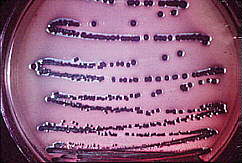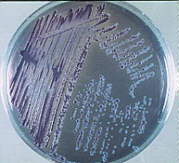

E. coli, the research tool of microbiology and genetics labs around the world, is the most encountered bacterium in the clinical laboratory. Besides being the number one cause of human urinary tract infections, E. coli has been linked to diseases in just about every other part of the body. Pneumonia, meningitis, and traveler's diarrhea are among the many illnesses that pathogenic strains of E. coli can cause. As part of the normal flora of the human intestinal tract, E. coli plays a crucial role in food digestion by producing vitamin K from undigested material in the large intestine. Pathogenic strains of E. coli, however, can cause severe cases of diarrhea in all age groups by producing a powerful endotoxin. Treating E. coli infections with antibiotics may actually place the patient in severe shock which could possibly lead to death. This is because more of the bacterium's toxin is released when the cell dies. Below are two examples of E. coli growing on eosin methylene blue(EMB) agar.





